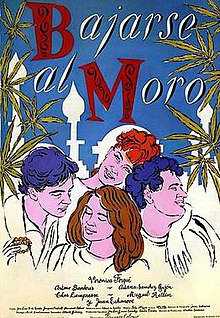Going South Shopping
| Going South Shopping | |
|---|---|
 Theatrical poster | |
| Spanish | Bajarse al moro |
| Directed by | Fernando Colomo |
| Screenplay by |
|
| Based on | Bajarse al moro by José Luis Alonso de Santos |
| Produced by |
|
| Starring | |
| Cinematography | Javier Salmones |
| Edited by | Miguel Ángel Santamaría |
| Music by | Pata Negra |
Production companies |
|
Release date |
|
Running time | 83 min |
| Country | Spain |
| Language | Spanish |
Going South Shopping (Spanish: Bajarse al moro, lit. 'Get Down to the Moor')[1] is a 1989 Spanish comedy film directed by Fernando Colomo based on the play Bajarse al moro José Luis Alonso de Santos. It Verónica Forqué alongside Antonio Banderas, Juan Echanove, and Aitana Sánchez-Gijón.
Plot
[edit]The plot tracks the mishaps of Chusa (a drug trafficker 'going south' to Morocco to buy hashish) and other characters based in the neighborhood of Lavapiés, including her cousin Jaimito, police agent Alberto, and virgin Elena.[2][3]
Cast
[edit]- Verónica Forqué as Chusa[2]
- Antonio Banderas as Albertico[2]
- Aitana Sánchez-Gijón as Elena[2]
- Chus Lampreave[3]
- Miguel Rellán[3]
- Juan Echanove as Jaimito[2]
Production
[edit]Based on José Luis Alonso de Santos's play Bajarse al moro, the screenplay was penned by Alonso de Santos alongside Fernando Colomo and Joaquín Oristrell.[4] The film is an Ion Producciones and Lolafilms production.[5] The score was composed by the sibling duo Pata Negra consisting of Rafael Amador and Raimundo Amador.[6] Shooting locations included Madrid, Chaouen, and Algeciras.[7] The dialogues incorporate elements of the cheli jargon characteristic of Madrid's outcast youth.[8]
Release
[edit]The film opened in theatres on 5 May 1989.[9]
Accolades
[edit]| Year | Award | Category | Nominee(s) | Result | Ref. |
|---|---|---|---|---|---|
| 1990 | 4th Goya Awards | Best Adapted Screenplay | Fernando Colomo | Nominated | [10] |
| Best Actress | Verónica Forqué | Nominated | |||
| Best Supporting Actress | Chus Lampreave | Nominated | |||
| Best Original Score | Pata Negra | Nominated | |||
| Best Production Supervision | Andrés Santana | Nominated | |||
| Best Sound | Miguel Ángel Polo, Enrique Molinero | Nominated |
See also
[edit]References
[edit]- ^ Perriam, Chris (2003). Stars and Masculinities in Spanish Cinema: From Banderas to Bardem. Oxford: Oxford University Press. p. 56. ISBN 0-19-815996-X.
- ^ a b c d e Corroto, Paula (13 December 2021). "Las mejores películas de Verónica Forqué: sus cuatro premios Goya y una bola extra". El Confidencial.
- ^ a b c Maldivia, Beatriz (14 August 2010). "'Bajarse al moro', desenfadada comedia sobre las buenas intenciones". Espinof.
- ^ Piñero, Margarita (2005). La creación teatral en José Luis Alonso de Santos. Madrid: Editorial Fundamentos. p. 400. ISBN 84-245-1021-6.
- ^ "Bajarse al moro". Biblioteca Virtual Miguel de Cervantes. Retrieved 27 October 2022.
- ^ Romaguera i Ramió, Joaquim (2002). El jazz y sus espejos. Vol. 1. Madrid: Ediciones de la Torre. p. 107. ISBN 84-7960-307-0.
- ^ Domínguez Saucedo (15 April 2012). "El Campo de Gibraltar, un extraordinario plató para la historia del cine". Andalucía Información.
- ^ Cebollada, Pascual; Santa Eulalia, Mary G. (2000). Madrid y el cine. Panorama filmográfico de cien años de historia (PDF). Madrid: Consejería de Educación. Comunidad de Madrid. p. 101. ISBN 84-451-1821-8.
- ^ Cebollada & Santa Eulalia 2000, p. 101.
- ^ Viaje al cine español. 25 años de los Premios Goya (PDF), Lunwerg, 2011, pp. 272–273, ISBN 978-84-9785-791-8
External links
[edit]
- 1989 films
- Spanish comedy films
- 1980s Spanish-language films
- Films shot in Madrid
- Films shot in Morocco
- Films shot in the province of Cádiz
- Films directed by Fernando Colomo
- 1989 comedy films
- 1980s Spanish films
- LolaFilms films
- Films set in Morocco
- Films about drugs
- Films set in Madrid
- 1980s Spanish film stubs
- 1980s comedy film stubs
